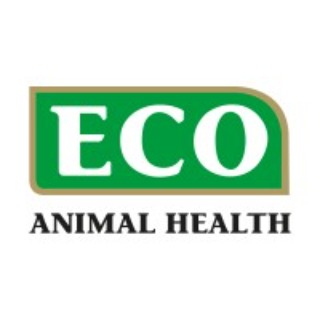New insights into tylvalosin in the management of respiratory disease in pregnant sows and piglets
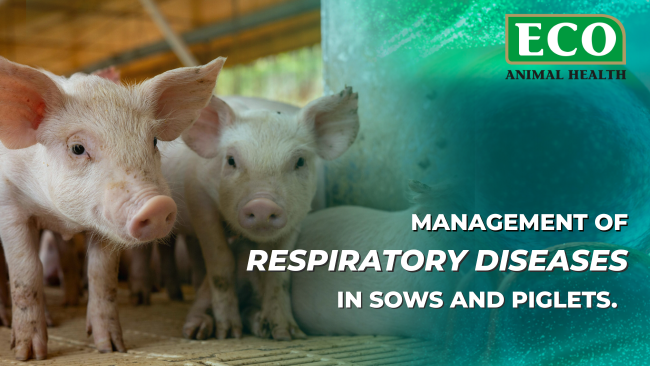
- Tylvalosin is an effective tool in the management of PRDC
- Tylvalosin has proven efficacy against Mycoplasma hyopneumoniae
- Tylvalosin has immunomodulatory effects that may help to combat porcine reproductive and respiratory syndrome virus.
Mycoplasma hyopneumoniae (M. hyo) and porcine reproductive and respiratory syndrome virus (PRRSV) are important primary pathogens in PRDC. Previous studies have shown that tylvalosin, a macrolide antibiotic, has good activity against M. hyo1 Responsible prescribing of antibiotics, or so-called antibiotic stewardship, is needed to reduce the growing problem of antibiotic resistance and typically, antibiotics are prescribed for the treatment of bacterial diseases after appropriate diagnostic testing. In addition, in vitro studies have indicated that tylvalosin could reduce disease severity via immunomodulation,2,3 through effects on cytokines. In vivo data is scarce, so a recent study was conducted to investigate the in vivo effect of administering tylvalosin in sows and piglets using either challenge with PRRSV-2 alone or in combination with M. hyo4.
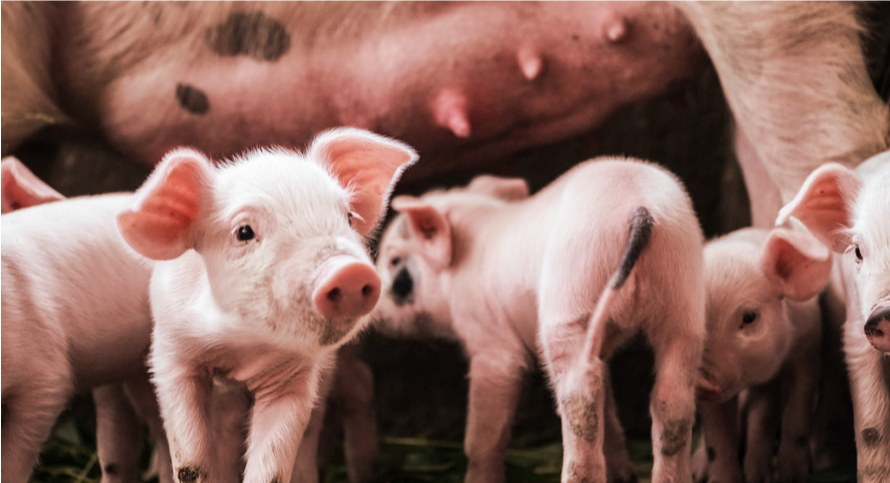
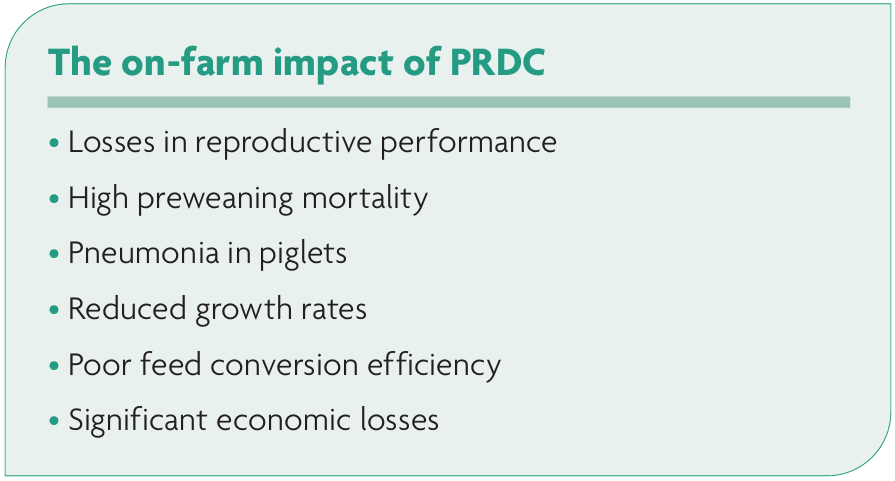
The effects of a water-soluble formulation of tylvalosin (Aivlosin® 625 mg/g Granules, ECO Animal Health, UK) on disease caused by porcine reproductive and respiratory syndrome virus alone in sows or in combination with Mycoplasma hyopneumoniae in piglets.
The study was conducted in two parts.
1. PRRSV challenge in pregnant sows
In the first part, pregnant sows were challenged with PRRSV-2 at approximately 85 days of gestation. Cytokines, viremia, viral shedding, sow reproductive parameters and piglet performance to weaning were evaluated.
- Six sows received water medicated at a target dose of 5mg tylvalosin/kg body weight/day from three days prior to challenge until the end of gestation
- Six sows were left untreated
- Six sows were untreated and unchallenged
The results of the PRRSV challenge study showed that:
- Tylvalosin significantly reduced the levels of pro-inflammatory cytokines, including IL-8, IL-12 and TNFα
- All piglets from tylvalosin treated sows that survived to weaning were PRRSV negative on faecal swabs, compared to…
- … 33.3 percent PRRSV positive piglets from untreated sows (p=0.08)
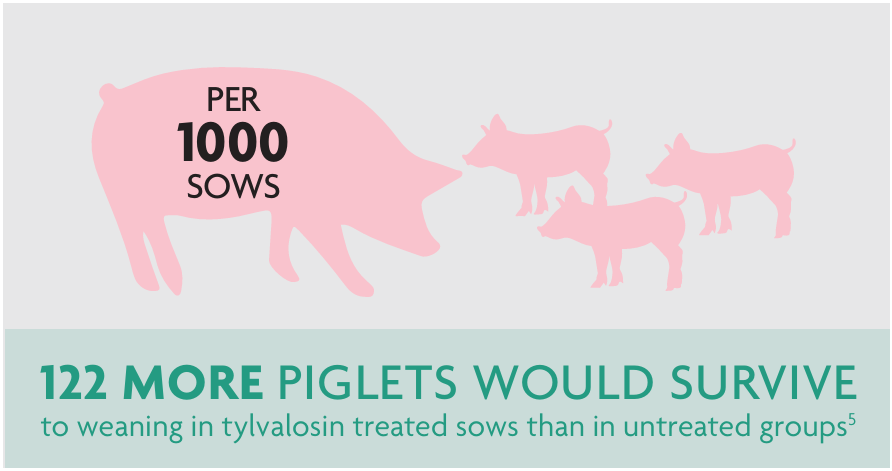
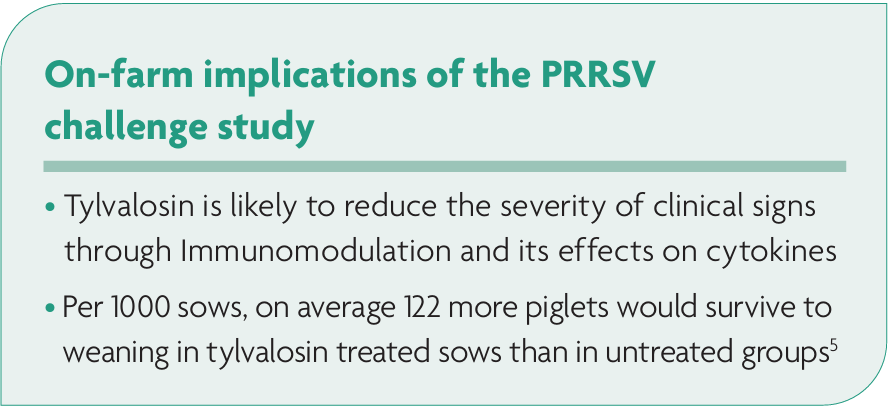
2. Dual challenge study in piglets
In the dual challenge study, piglets were challenged with M. hyo on days zero, one and two, and with PRRSV-2 on day 14. Cytokines, viremia, bacteriology and lung lesions were evaluated.
- Eight piglets received water medicated at a target dose of 20mg tylvalosin/kg body weight/day, which is higher than the label dose.
- Eight piglets were left untreated.
The results of the dual challenge study showed that:
- Tylvalosin significantly reduced the serum levels of 16 cytokines (p<0.001), including IL-8 and TNFα
- Tylvalosin reduced the lung levels of IL-8, IL-10 and IL-12 (p<0.001)
- Tylvalosin increased the serum levels of IFNα (p<0.001)
- Lung lavage samples from tylvalosin treated piglets were negative for M. hyo (0cfu/ml), compared to…
- … mean M. hyo counts of 2.68 x 104 cfu/ml (p=0.023) in the untreated piglets
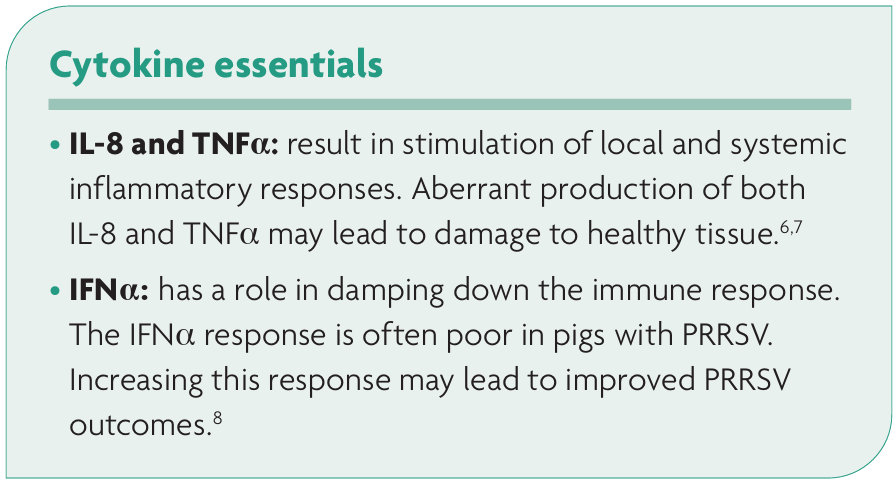
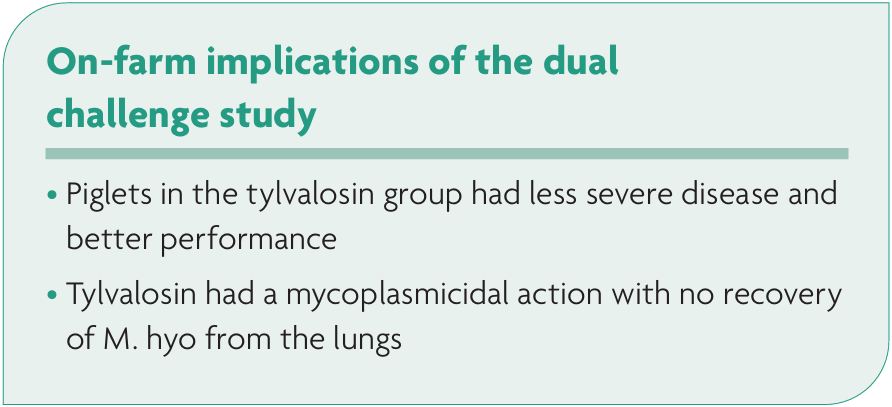
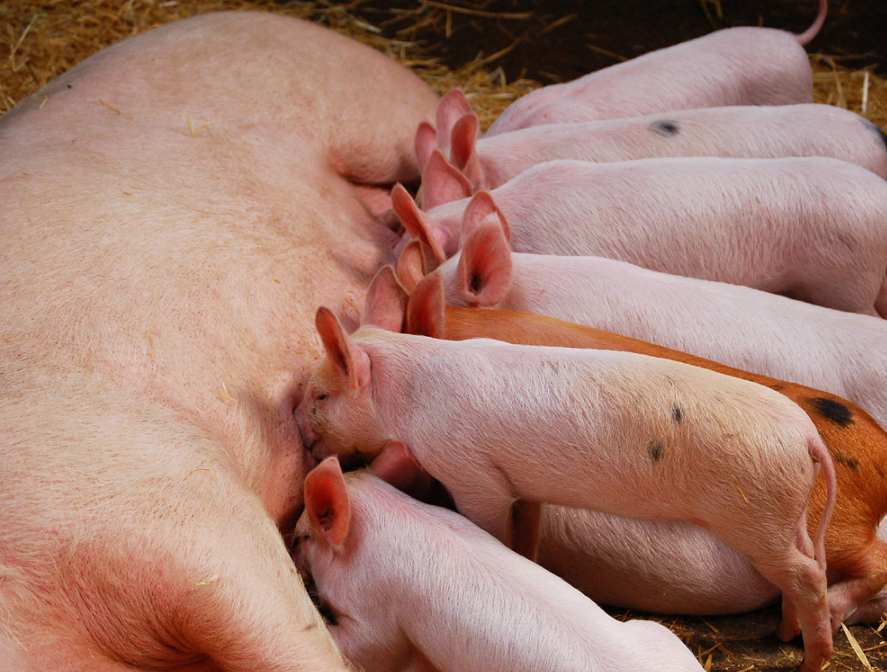
A cost-effective solution
Tylvalosin reduced M. hyo counts in the lungs and showed a highly significant immunomodulatory effect on multiple cytokines in both sows and piglets challenged with M. hyo and or PRRSV. In operations with coexisting M. hyo and PRRSV infections, tylvalosin presents a cost-effective solution that will have a measurable impact on animal health.
To discuss the management of porcine respiratory disease on your farm, or to learn more about the responsible use of tylvalosin, contact our technical services team by emailing enquiries@ecoanimalhealth.com
References
- Lopez Rodriguez, A., et al. Evaluation of the clinical efficacy of a water soluble formulation of tylvalosin in the control of enzootic pneumonia associated with Mycoplasma hyopneumoniae and Pasteurella multocida in pigs. Porcine Health Manag. 2020;6(1):39
- Tisoncik, J., et al. Into the eye of the cytokine storm. Microbiol Mol Biol Rev. 2012;76(1):16–32
- Moges, R., et al. Anti-inflammatory benefits of antibiotics: Tylvalosin induces apoptosis of porcine neutrophils and macrophages, promotes efferocytosis, and inhibits pro-inflammatory CXCL-8, IL1α, and LTB4 production, while inducing the release of pro-resolving Lipoxin A4 and Resolvin D1. Front Vet Sci. 2018;5:57
- Lopez Rodriguez A., et al. Effects of a water-soluble formulation of tylvalosin on disease caused by porcine reproductive and respiratory syndrome virus alone in sows or in combination with Mycoplasma hyopneumoniae in piglets. BMC Vet Res. 2023 Feb 1;19(1):31
- Statistical modelling using the study data
- Van Gucht S., et al. Interaction between porcine reproductive-respiratory syndrome virus and bacterial endotoxin in the lungs of pigs: potentiation of cytokine production and respiratory disease. J Clin Microbiol. 2003;41(3):960–966
- Bordon J., et al. Understanding the roles of cytokines and neutrophil activity and neutrophil apoptosis in the protective versus deleterious inflammatory response in pneumonia. Int J Infect Dis. 2013;17(2): e76–e83
- Brockmeier S.L., et al. The presence of alpha interferon at the time of infection alters the innate and adaptive immune responses to porcine reproductive and respiratory syndrome virus. Clin Vaccine Immunol. 2012;19(4):508–514
Contact:
Contact us using the following form.

